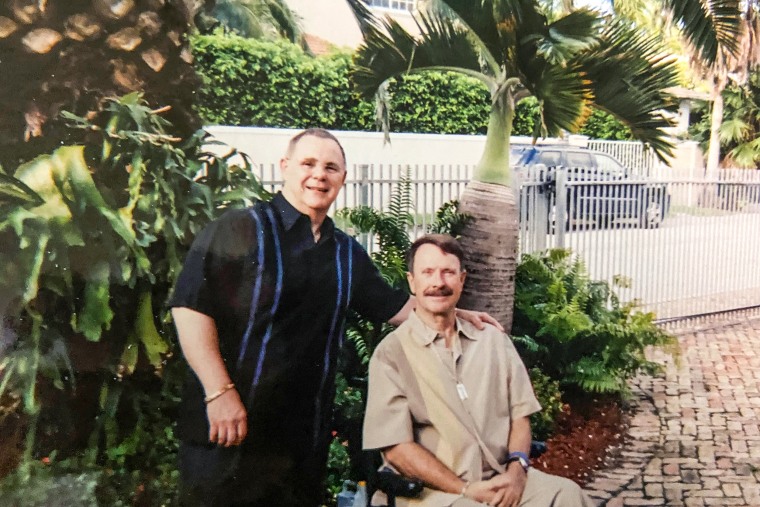Navy veteran Rhett Chalk was rendered quadriplegic on Thanksgiving Day in 2003 after his knee — which he severely impaired while serving in Vietnam — gave out, causing him to suffer a life-changing spinal injury.
At the time, Chalk had been with his partner, Lawrence Vilord, for roughly 26 years. However, Vilord was barred from riding alongside Chalk in the ambulance or from consulting with his doctors because he was not his legal spouse or family member.
But that day, Vilord became the one who would care for Chalk until the veteran died in June 2020.
"Practically every night when I gave him a shower, religiously every night, he would say to me, without a doubt, 'Thank God I have you in my life' because he says 'I would never have been able to survive; you've been my Rock of Gibraltar,'" Vilord, 77, told NBC News.
So when he was denied the full amount of enhanced Dependency and Indemnity Compensation (DIC) benefits — which are granted to surviving spouses of disabled veterans — by the Department of Veterans Affairs last November, he said it frustrated him "to the point of no return."
"It was just another nail in the coffin. It was another nail in my heart," Vilord said. "It was just another thing to delegitimize who I was and who he was."
He qualified for the VA's standard Dependency and Indemnity Compensation benefits for surviving spouses, which amounts to $1,300 a month. Vilord and Chalk married in 2017 after the Supreme Court's landmark decision in Obergefell v. Hodges legalized same-sex marriage nationally in 2015.
However, because the pair were not married for at least eight years, Vilord was denied last October the VA's enhanced benefits for survivors of certain veterans who are declared totally disabled at the time of death, for which Chalk qualified. The benefits would grant Vilord another $280 per month.
Vilord appealed his denial before the VA and in federal court last week, arguing that the rule effectively disqualifies all same-sex couples in nearly every state, including in his home state of Florida.
"Our argument though is that the mechanical application of that requirement does injustices in cases such as Mr. Vilord's where he could not possibly have met the requirement," said Tyler Patrick, one of the student members of the Veterans Legal Clinic at Harvard Law School, which is representing him. "It's unconstitutional, not to mention nearly unjust, to deny him these benefits, these benefits that he is deserved after serving as his partner's caretaker for 18 years, on the basis that Florida prevented him from marrying until 2015."
"We argue that because the VA in making this determination looks to Florida state law, a state law which was unconstitutional and unconstitutionally as ruled in Obergefell prevented Mr. Vilord and Mr. Chalk from marrying, VA can't then use that unconstitutional state law as the basis for its denial of his enhanced DIC benefits," Patrick continued.
The VA did not immediately respond to a request for comment.
Patrick also points to previous cases where LGBTQ widowers have successfully petitioned for Social Security survivors benefits, after arguing that they were prevented from marrying, and therefore qualifying, because of bans on same-sex marriage.
Last year, federal district courts in Arizona and Washington ruled that excluding same-sex partners from Social Security benefits was unconstitutional. Shortly after, the benefits were put in legal limbo after the Department of Justice under the then-Trump administration appealed the two rulings. However, the department and the Social Security Administration under the Biden administration dismissed the appeals earlier this month.
Patrick said Harvard Law School determined that Vilord is the first person to challenge the requirement, making it a precedent-setting case for LGBTQ widowers of disabled veterans.
Vilord says he hopes his case will help others earn the benefits that they deserve.
"I just feel that there's got to be somebody else out there that this will make a difference for," he said. "I may not need it, OK? It's not going to make a huge difference in my life. It's not a great deal of money. It's just the principle behind it."

